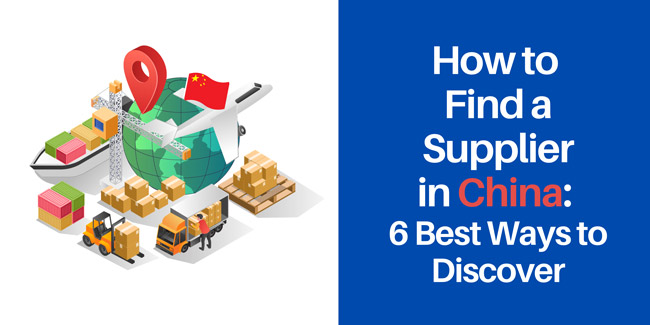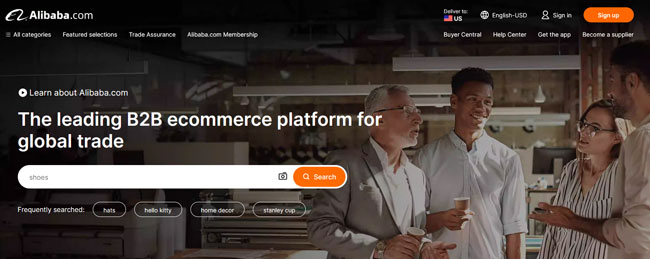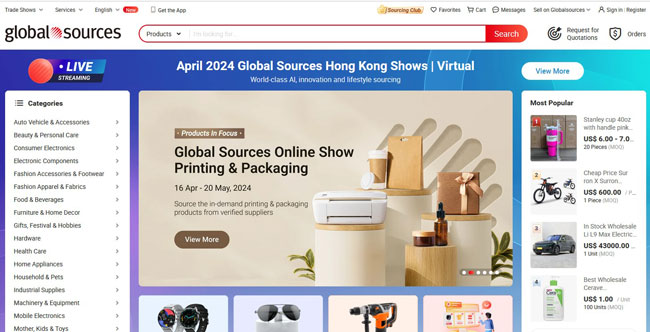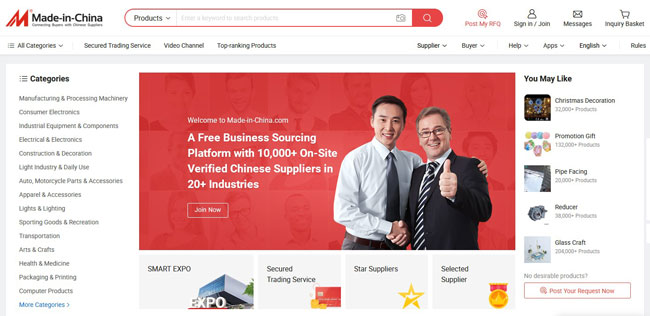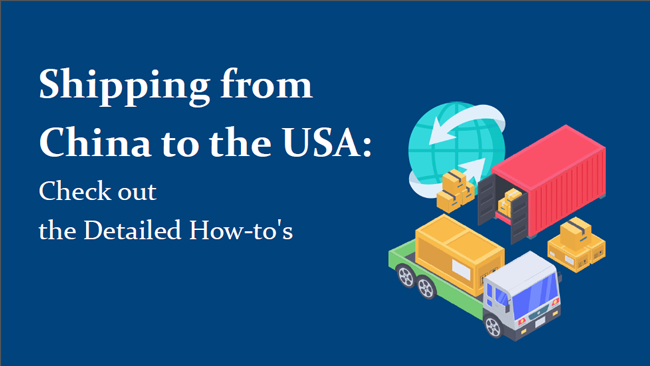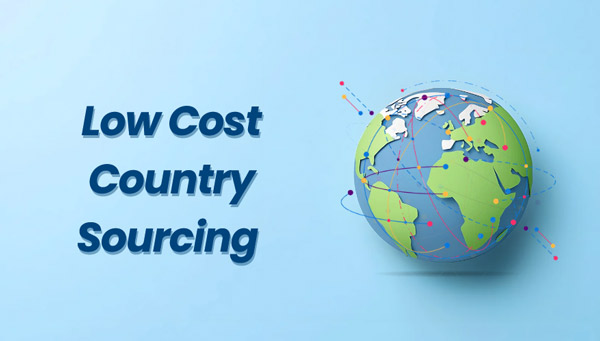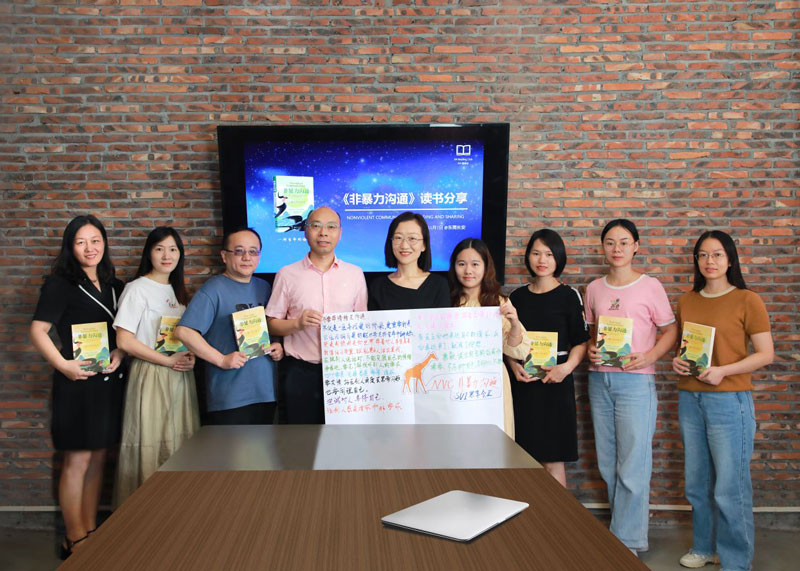How to Find a Manufacturer in China: Methods You Can't Miss
- Date:
- Author: SVI Content Team
- Share:
Suppliers are the backbone of your supply chain. Companies that want to get low-cost products cannot cast a veil over manufacturers from China in which has a pool of diverse product categories with competitive pricing.
But you know, finding reliable Chinese suppliers is not always an easy thing. Many businesses, big or small, often struggle with the initial steps of sourcing overseas – How to find a manufacturer in China. No worry!
There are many flexible methods for you to learn how to find Chinese manufacturers to get quotations and make your products. In this guide, we’ll show you the popular and practical ways to start sourcing for your business. Let’s get started.
Method 1. Explore Online Sourcing Platforms
“Where can I source for suppliers?” If the question has been bothering you, why not try looking for them through online sourcing websites?
These platforms offer a vast array of factories across multiple industries. Moreover, these provide filters and search options, so buyers can easily search for potential suppliers based on location, product category, or other specific criteria.
Pros of Online Sourcing Platforms
- Wide range of suppliers across product categories.
- Easy comparison of prices and manufacturer profiles in China.
- Time-efficient sourcing with verification processes.
- Reduce costs by finding competitive prices and cost-effective suppliers.
Cons of Online Sourcing Platforms
- Supplier quality varies greatly. It takes time to evaluate a high-quality one among numerous options.
- Many listings include not just factories, but trading companies and sellers.
Top Online Platforms to Find Manufacturers in China:
Several popular platforms are widely used source a Chinese supplier:
🔹 Alibaba
Alibaba.com is one of the largest and most well-known global B2B sourcing platforms. It brings you a vast array of verified suppliers across multiple industries, offering a wide range of products and services. You can search and connect manufacturers directly through online chatting.
🔹 Global Sources
Global Sources is another prominent online platform for B2B sourcing. It connects buyers with suppliers from around the world and covers extensive industries like electronics, machinery, apparel, and more. It’s also the organizer of large trade fairs in Hong Kong, making it ideal for professional importers.
🔹 Made-In-China
Made-in-China.com serves as a platform for connecting global buyers with manufacturers, suppliers, and products from China. It showcases manufacturers across different industries and provides comprehensive profiles, product listings, and contact information.
You can easily compare prices and send inquiries. It only provides inquiries with suppliers rather than ordering products directly.
Other Online Platforms
Additional sourcing sites for different buyer needs include:
- 1688.com
- Hong Kong Trade Development Council (HKTDC)
- Yiwugo.com
- DHgate
- MFG.com
- LightInTheBox
- AliExpress
- Temu
| Platform | B2B / B2C | Target Market | Supplier Types | Product Categories |
|---|---|---|---|---|
| Alibaba | B2B | Global | Trading companies, factories, wholesalers | Almost all categories – Industrial, consumer goods, electronics, clothing |
| Global Sources | B2B | Global, trade shows | Verified factories and exporters | Consumer electronics, home, gifts, hardware |
| Made-in-China | B2B | Global | Factories | Industrial, consumer, textile, machinery, tools |
| 1688.com | B2B | China domestic | Factories, wholesalers | All consumer and industrial categories |
| HKTDC | B2B | Asia/Global | Brands, factories, companies | Gifts, electronics, packaging, apparel |
| MFG.com | B2B | Global industrial buyers | Custom manufacturers, fabricators | CNC machining, metal parts, injection molding, industrial components |
| Yiwugo.com | B2B/B2C | China, wholesalers | Yiwu market sellers, factories, trading companies | Small commodities, gifts, stationery, household goods, toys, accessories |
| DHgate | B2B/B2C | Global, SMEs/retailers | Traders, resellers, some factories | Consumer goods, electronics, apparel, accessories (low MOQs) |
| AliExpress | B2C | Global consumers | Small sellers, resellers, few factories | Apparel, electronics, home goods, beauty |
| LightInTheBox | B2C | Global retail consumers | Factory-direct, resellers | Apparel, home décor, electronics, lifestyle |
| Temu | B2C | Global consumers | Brands, small sellers, resellers | Low-cost consumer goods, fashion, home, gadgets |
Method 2. Engage Sourcing Agents
When you have difficulties vetting suppliers in China due to insufficient time, language barrier or other factors, sourcing agents can be your smart move.
The sourcing agencies are professional entities that know how to find overseas manufacturers who have authority.
More: What Is Sourcing Agent? What Do Sourcing Agents Do?
How Sourcing Agencies Assist in Finding Manufacturers in China:
1) After knowing your sourcing requirements and expectations, sourcing companies will thoroughly analyze your requirements and specific challenges.
2) Next, agents will utilize their networks, industry knowledge, and expertise to identify qualified suppliers based on the initial analysis.
3) During the vetting, they will conduct thorough evaluations to assess the manufacturing capabilities, certifications, and compliance, quality control processes of manufacturers.
4) And they act as intermediaries between buyers and manufacturers to manage communication and order production.
Benefits of Partnering with Sourcing Agencies:
Here are the pros of outsourcing to sourcing companies:
- Have extensive knowledge and experience in supplier sourcing
- Get an expanded network of reliable suppliers
- Save time and cost through efficient sourcing
- Mitigate risks by conducting supplier evaluation
- Guard the product quality through quality control measures
- Overcome cultural and language barriers in international sourcing
- Help companies focus on their core competencies and strategic priorities
Partnering with SVI Global
SVI Global is a sourcing agency that provides services in sourcing, production management, product development, and quality control.
It is a US-based company with offices located in China and other Asia countries, which can quickly respond to clients targeting Asia and Mexico markets.
We have been deeply engaged in supply chain management for over 22 years, accumulating extensive experience and a network of high-quality factory resources.
Your goals, values and interests are our priority. With our extensive network and industry expertise, SVI Global assists you in finding the right suppliers in China effortlessly.
Need Help for Your Sourcing Project?
Let SVI Global find the right suppliers and manage your project.
We guarantee quality and on-time delivery!
Method 3. Attend Local Trade Shows
Attending trade shows remains one of the most effective ways to find Chinese manufacturers. Many suppliers will use these events to display products, discover new opportunities, and meet buyers face-to-face to form partnerships.
According to the official data, the 138th Canton Fair had attracted over 310,000 overseas buyers from 223 countries and regions, an increase of 7.5% compared with the previous session.
What Can a Trade Show Get You:
- Face-to-Face Interactions: Trade shows provide an opportunity to meet factory’s sales in person, allowing for direct communication and building relationships.
- Product Showcase: Exhibitors at trade shows often display their products to attract interested clients. You have the chance to see and evaluate the quality, design and features firsthand.
- Networking Opportunities: Trade shows attract industry professionals, including suppliers, manufacturers, and experts. Meeting with fellow attendees can gain valuable connections and open doors to potential partnerships.
Popular Trade Shows in China Held Every Year
◼ The Canton Fair (China Import and Export Fair) – twice a year in Guangzhou, China (Spring – started at April 15th; Autumn – started at October 15th).
◼ CIIE (China International Import Exposition) – once a year in November in Shanghai, China
◼ CIIF (China International Industry Fair) – once a year in September in Shanghai, China
◼ Yiwu International Commodities Fair – once a year in October in Zhejiang, China
◼ The East China Fair (East China Import and Export Commodity Fair) – once a year in March in Shanghai, China
Tips for Finding Good Manufacturers in China:
✔ Pre-Show Preparation:
Before attending a trade show, conduct research to identify relevant events in your industry or niche.
Look for trade shows that specifically cater to your target suppliers, and set specific goals and objectives and create a list of exhibitors you are interested in connecting with.
✔ Effective Networking:
Develop business cards to introduce your business, actively engage with exhibitors, ask questions, and express your interest.
Finally, don’t forget to exchange contact information or schedule follow-up meetings or calls
✔ Utilize Digital Tools:
For some trade fairs, they will display the exhibitors on their websites. If it’s possible, you can check exhibitor lists ahead of the shows to locate potential suppliers efficiently.
✔ Post-Show Actions:
If you have identified promising manufacturers during the exhibition, take the opportunity to schedule visits to their factories. This will provide you with the ability to get to know their actual capabilities.
Method 4. Utilize Referrals and Professional Network
Another helpful and quick way to know how to find Chinese manufacturers is through referrals.
Reach out to business partners, industry associations, or friends who have sourced from China before. You can gain authentic feedback and ensure credibility and reliability, as they have firsthand experience working with the recommended suppliers.
Benefits of Recommendations from Your Networks:
1) Credibility: Recommendations come from trusted sources with real experience.
2) Time Savings: Skip the trial-and-error phase of vetting unknown suppliers.
3) Reduced Risk: Verified feedback reduces the chance of poor quality or scams.
If you have local Chinese contacts, that’s even better. They can help provide introductions and verify factory.
Method 5. Conduct Online Research via Search Engines
If you don’t know how to find a supplier, online searching is a pretty convenient way. Search engines like Google, Yahoo, Bing and Baidu (China) to locate suppliers directly.
From the suppliers’ official website to the industry’s forums, there are things waiting to be discovered.
How to Find Reliable Manufacturers in China Through Online Research:
1) Use Specific Keywords: Search specific keywords like “how to find suppliers” or “how do I find a manufacturer in China.” Try including sourcing products, such as “find clothing manufacturers in China,” or “how to find office supply manufacturers in China,” to narrow down your search.
2) Include Variations and Synonyms: If you’re searching for “clothing supplier,” you could also include terms like “garment manufacturer,” “clothing vendor,” or “hoodie manufacturer” for broader results.
3) Add Location Keywords: For example, if you are looking for a stationery manufacturer in China, include “China stationery manufacturer,” or “Guangdong clothing factory” in your search.
4) Explore Multiple Search Engines: Don’t limit yourself to a single search engine. Different search engines may yield slightly different results.
Tips for Evaluating Supplier Websites:
Once you identify potential suppliers through online research, visit their websites to gather more information. Check out the following aspects:
- Review product specifications or service descriptions.
- Find available product catalogs or brochures.
- Click to view their provided services.
- Check the “About Us” section for company history, reputation, and leadership.
- Ensure clear contact information (address, email & tel) is available.
- Find their company addresses to see whether they match the profile.
- View their company social media, including LinkedIn, Facebook, YouTube, etc.
Method 6. Leverage Social Media
How to find manufacturers to make your product? Social platforms can be a practical way to explore Chinese vendors.
Social media like LinkedIn, Facebook, Twitter and forums provide opportunities to reach a global network and access a vast pool of suppliers.
Platforms to Explore:
- LinkedIn: Search industry professionals or groups.
- Facebook: Join sourcing communities for recommendations.
- Forums (like Reddit): Post sourcing questions and get referrals.
- YouTube: Watch supplier reviews, sourcing tips, and factory tours.
- Twitter (X): Follow hashtags related to Chinese manufacturing.
Benefits of Engagement on Social Media:
- Connect directly with potential suppliers, and industry experts in China.
- Build relationships and expand your professional network.
- Receive industry viewpoints, market trends and the latest information from China’s suppliers.
- Seek referrals from industry peers or professionals in sourcing from China.
What to Check When Selecting Suppliers in China
When weighing your choice of a China supplier, focus on these essentials:
1) Product Quality: Always check samples and review the supplier’s quality control system. Consistent quality is essential to protect your brand and keep customers satisfied.
2) Production Capacity: Carefully go through factors such as production facilities, equipment, workforce, and ability to scale production to meet your order volume. For high-volume orders, a supplier that cannot scale may delay your growth.
3) Reliability: Look for references and reviews from other customers to gauge their track record for on-time delivery and reliability.
4) Certifications and Compliance: Verify that the supplier meets international standards and holds the proper certifications for your industry (e.g., ISO, CE, FDA). This ensures compliance and avoids costly issues at customs.
5) Pricing: Don’t just chase the lowest price. Look for transparent quotes that balance cost and value and align with your budget.
6) Communication: Language proficiency, transparency and the ability to understand and address your requirements promptly are what you should think about. Strong communication is key when working across languages and time zones.
FAQ about Finding a Manufacturer in China
Q1. What is the most manufactured product in China?
China produces a wide range of goods, including electronics, textiles, machinery, furniture, homeware, toys, and packaging materials. The most dominant export industries are:
- Electronics (phones, computers, semiconductors)
- Machinery and equipment
- Vehicles
- Renewable energy (solar panels, batteries)
- Plastics and chemicals
- Furniture and home goods
- Steel, metals, and construction materials
- Toys and sporting goods
- Apparel, textiles, and footwear
- Optical, medical, and technical devices
Q2. What are the top manufacturing areas in China?
The top regions based on revenue in manufacturing:
- Guangdong Province – Shenzhen, Guangzhou, Foshan, Dongguan
- Jiangsu Province – Suzhou, Wuxi, Changzhou, Nanjing
- Shandong Province – Qingdao, Yantai, Jinan
- Zhejiang Province – Ningbo, Hangzhou, Wenzhou, Taizhou
- Fujian Province – Fuzhou, Quanzhou, Xiamen
- Anhui Province – Hefei, Wuhu, Chuzhou
- Hebei Province – Tangshan, Shijiazhuang, Cangzhou
- Sichuan Province – Chengdu, Mianyang, Yibin
- Henan Province – Zhengzhou, Luoyang, Nanyang
- Hubei Province – Wuhan, Xiangyang, Yichang
Q3. What are the pros and cons of sourcing from Chinese manufacturers?
Advantages:
- Lower production costs.
- Wide product variety & industrial clusters.
- Mature supply chain and skilled labor base.
- Scalable production for both small and large orders.
Disadvantages:
- Quality inconsistency without proper control.
- Communication and time-zone barriers.
- Long shipping lead times.
Q4. What should you prepare to get an accurate quote from Chinese factories?
Before asking for quotes, prepare:
- A detailed product specification sheet (materials, size, functions, color, quantity).
- Packaging and labeling requirements.
- Quality standards or certifications needed.
- Target delivery timeline and preferred shipping terms (FOB, CIF, EXW, etc.).
- Use visuals or drawings when describing product specifications.
Q5. How do I deal with Minimum Order Quantities (MOQs)?
Most Chinese manufacturers set an MOQ to ensure production efficiency and profitability. It’s how they balance raw material purchases, labor setup, and machine time. MOQs vary depending on your product type and material.
If you’re new to partnering with a supplier, start with samples or trial orders before placing bulk orders. To negotiate a lower MOQ, it’s important to let factories believe your business is promising.
By the way, some suppliers may agree to lower MOQs if you’re flexible on a slightly higher price per unit, or limited customization.
Q6. How do I ensure product quality when sourcing from China?
- Verify the manufacturer‘s credibility. Confirm their business license, certifications (ISO, CE, FDA, etc.), and past export experience.
- Request pre-production samples. Only confirm the order after the sample matches your quality standards.
- Set clear quality specifications in writing. Never rely on verbal promises. Provide detailed documentation with material specs, dimensions, color codes, packaging requirements, and acceptable tolerances.
- Conduct on-site or third-party inspections. Perform pre-production, during-production, and final inspections before shipments.
- Include quality clauses in your contract. Define what constitutes a defect, acceptable defect rate, and the responsibility for replacements or refunds.
- Always ask the supplier for QC photos or videos before shipment. Experienced importers don’t skip this last step — it prevents most post-delivery surprises.
Q7. How to communicate with Chinese suppliers effectively?
Over years of dealing with Chinese suppliers, here are practical communication habits that make partnerships smoother and faster:
- Be clear, concise, and visual. Remember, many suppliers use translation tools, so simplicity matters more than eloquence.
- Confirm, then reconfirm. After every discussion, summarize what was agreed on in writing.
- Use WeChat for quick updates. Most Chinese suppliers prefer WeChat for real-time communication. It’s faster than email — good for tracking sample progress or production status.
- Work across time zones strategically. China’s working hours might not align with yours. Schedule messages or calls that fall within their business hours for faster replies and smoother coordination.
Wrapping Up
If you’ve been wondering how to find a manufacturer in China, this guide gives you a complete roadmap, from online platforms and trade fairs to sourcing agencies and referrals.
By making use of the potential around you and diversifying your approach, it is able to increase the likelihood of finding the right suppliers that meet your specific requirements.
Remember, make up your goals at first and check out the suppliers to see whether they are qualified according to your measure. Moreover, building and managing strong relationships with suppliers is key to long-term success. A sustainable partnership is a win-win situation.
Don’t settle for ordinary when you can achieve excellence. If you want to elevate your operation to the next level, a global sourcing company will be a good partner. SVI Global, with its extensive networks, provides comprehensive sourcing solutions for sourcing. From production management and factory contact to price negotiation, everything needed is supplied in sourcing.

